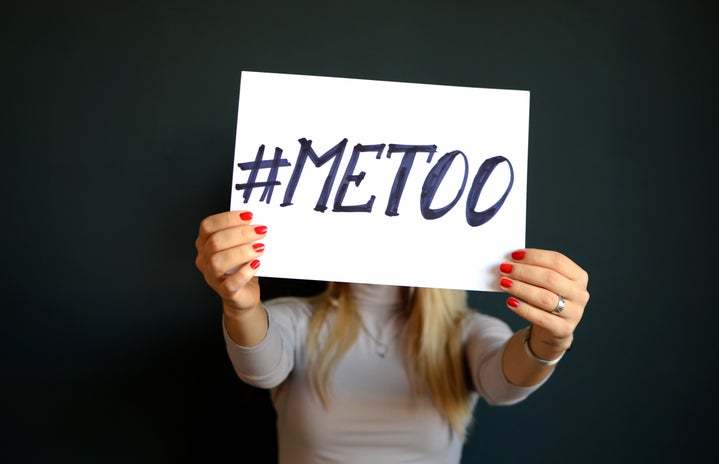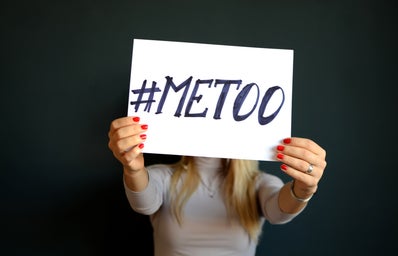The first time a friend confided in me that they were sexually assaulted, I was just starting high school. And then it happened a second time to a different friend. And then a third to someone else. By the time prom rolled around, I was dangerously close to not knowing anyone — of any gender — who hadn’t been sexually assaulted. But it wasn’t until I turned 24 that someone I knew finally went to court, only to have their case dismissed as a “he said, she said” after months of legal struggle.
In early 2015, news stations across North America reported on Stanford University when one of the school’s star athletes was arrested on suspicion of sexual assault after leaving a frat party. Brock Turner, aged 19 at the time, was attending the college on a swimming scholarship. The Washington Post called him “a record-setting swimming prodigy.” The case opened conversations about sexual assault on campus and the prevalence of party culture. In 2016, he was convicted on three felony charges of sexual assault. He was sentenced to six months in prison, though legal experts say a standard sentencing is six years. After three months, Brock Turner was released due to good behaviour.
Chanel Miller, known throughout the trial by her pseudonym Emily Doe, wrote a detailed memoir of the trial and how the legal system can continue to traumatize victims. After public outcry during the trial, California created a new legislation imposing a mandatory sentence for sexual assault charges.
Know My Name: A Memoir acts as a feminist manifesto for survivors
In 2015, Chanel Miller was split in two. Chanel got up every morning, smiled at work and helped her sister with school, while Emily Doe had her naked body poked, prodded and shoved in the dirt behind a dumpster near Stanford University. Emily showed up to the courtroom; Chanel had to pay rent. Know My Name is a memoir and a feminist manifesto all in one.
This memoir came out in 2019. As we are approaching the year 2022, I understand that for some, this might not be the most timely of articles. For others––myself included––it is. I feel like it’s every day that I open my phone and hear about a new case of someone getting sexually assaulted on a college campus, hoping each time it isn’t someone I know. But if it wasn’t, would it really matter?
In October, CBC News reported that the University of Saskatchewan students had staged a walkout, protesting in support of a woman who said she was sexually assaulted on campus. Though the suspect is currently facing charges, I can’t help but remember a 2018 Washington Post article, which stated that less than one percent of rape and attempted rapes lead to a felony conviction.
Know My Name goes into detail about how gruelling the trial was — how, without a moment’s notice, the next court date can be pushed by four, six, or even 12 months. Chanel talks about how she was one of the lucky ones to be able to press charges right away, or to move back in with her parents and avoid homelessness when the trauma of her rape made her unable to work. Chanel, as it turns out, was one of the few women whose hospital rape kits actually got analyzed before the bacteria got mouldy and became useless. Considering how few sexual assault trials end with a prison sentencing, it seems that Brock Turner serving three months was advantageous.
I know a woman who became an esthetician after a six-month course. I’ve done unpaid internships longer than Brock Turner was in jail. If you were to put asparagus seeds in the ground on the first day Brock Turner was jailed, it would still take another two years and nine months following his release for the vegetable to be ready to harvest.
A crime of opportunity is still a crime
Perhaps what shocked me the most wasn’t that Brock Turner’s father said his son’s life shouldn’t be ruined for getting “20 minutes of action,” but rather that at the beginning of the trial, the three-months-jailed rapist said he probably couldn’t pick Chanel out in a lineup. He didn’t know her face and he certainly didn’t know her name. But he sure knew to run when two witnesses confronted him about inserting his body into an unconscious woman behind a dumpster.
I’ve never met Chanel Miller, however, I can’t help but feel like I know her. In her 13-page victim impact statement, she describes the feeling of numbness on her skin in the days after the assault; how your body can feel unlike your own, how you may want to cry, scream and throw up but there’s a weight in your throat that doesn’t allow anything to come out. All of a sudden, I’m back sitting in a grade 10 bathroom, wiping tears off my friend’s face when she tells me how her boyfriend conveniently overlooks her every time she says no.
I’ve heard people talk about this case as a crime of opportunity, and maybe it’s true that some people will take advantage of the fact that a woman may be alone at night. But for bystanders, it’s the opportunity to see that she’s safe. You have the opportunity to call an ambulance. You have the opportunity to save someone’s life.
Perhaps some people will read Know My Name and think of it as a harrowing memoir in which women shouldn’t drink too much or go to parties. But to do so is to make a subtle jab — to whisper to yourself “I hope the other girl gets raped instead of me.”
In Brock Turner’s own victim impact statement, published in full by The LA Times, he talks about the influence of alcohol and peer pressure. And I can’t deny that many of us in university are quick to turn to liquor as a way to reward ourselves after midterms. Consensually drinking with your friends or hooking up with someone at a party isn’t a crime. And getting involved with a fraternity doesn’t necessarily mean someone is destined to commit sexual assault. But it’s worth noting that college students often criticize how fraternities can normalize uncontrolled alcohol consumption. Brock Turner, though convicted of sexual assault, is a symptom of a culture that assumes if you’re at a frat party, you’re there to get blackout drunk and hook up. Consenting to drinking is not consenting to have sex. And if someone is unconscious, they are incapable of consenting.
Chanel Miller’s case was just different enough to get a conviction
If you think the biggest problem with the legal system is that women just don’t report their sexual assaults immediately, you should read Know My Name. It is a book that will serve as a harsh wake-up call, proving that navigating the complexities of the legal system can often take years. In Chanel’s case, there were a few defining factors that just so happened to line up enough to get a conviction, even if it was shorter than a school semester.
The first is that Chanel was, at the time of the assault, earning enough money to get a lawyer. Despite having to quit her job to be a part of the lengthy trial, she could move back in with her family to avoid eviction from her apartment. Her sister, however, was in university at the time and nearly flunked out because of how much time she had to constantly take off in order to be at the trial as a witness. Secondly, Chanel had left a voicemail to her boyfriend before her unconscious body was attacked behind a dumpster. This voicemail audibly showed the courts that she could hardly speak, and if her words are unintelligible, then she could not have vocalized her consent. Third, two Stanford students biking by passed the dumpster and stopped the assault in action and called the police. Lastly, Chanel was fortunate enough to be in a major city where hospitals have rape kits available. The rape kits, as the book describes, are horribly invasive procedures that can take months or years to have analyzed. Because Chanel was assaulted by Brock Turner, a national American athlete, it was a special case: hers was sped up in the queue and she only had to wait six months for DNA to show her body was violated. Lastly, she had a family who supported her.
The raw truth of the matter is that you can do everything “right” as a victim and still get nothing. You can do everything right when you’re attacked and still be part of the 99 per cent whose attackers are never convicted. You can spend months preparing your case with a lawyer only to have the judge just dismiss the case because the legal system presents too many delays. Or maybe you feel lost as a victim because the person who assaulted you was a cop. Maybe you report your assault and the police charge you with mischief for “wasting the officer’s time” after degrading you in an interrogation.
Campuses are still struggling to deal with sexual assault among students
It won’t always be a Chanel who gets raped. Sometimes it will be an Ava, who was sexually abused by her boyfriend at Western University only to have police tell her that’s not a crime. The Globe and Mail reported that Ava is one of “5,000 allegations of sexual assault closed as unfounded by Canadian law enforcement every year.” Maybe you don’t know an Ava, instead you know a Chloe who goes to Concordia. Chloe had a restraining order on her attacker after suffering enough physical and sexual abuse that she has permanent hearing loss, yet he avoided a permanent criminal record on the grounds that a judge said he was a kid with good grades. Chloe pursued the trial only with the guidance of a kind law professor, who agreed to represent her for free. But this Chloe could be an anomaly, the devil’s advocate may say. Let’s instead look at a Meghan, who was raped at Queen’s University.
Meghan and Chanel have about one similarity: both were granted access to a rape kit. Meghan was told at the hospital that DNA evidence from a rape kit is useless: all it proves is that sex happened. So she tries to report it to the university, only to have the Queen’s University Human Rights and Equity Office dismiss her claims without taking notes. So she tries Kingston Police, who dismissed her case just as the university did, without writing down any of her claims.
Brock Turner discussed in his victim impact statement how universities suck you into a party culture, where getting hammered just can’t be helped. He wrote in the statement: “Having spent most of my time around people that consumed alcohol on a daily basis, I thought it was fundamental to being in college and living like a college student.” The reality of university party culture isn’t that it creates victims of sexual assault, but rather that it allows rapists to get away with crimes under the guise of “Welcome to college, baby!”
People tried to dismiss Chanel Miller because she was at a frat party, but as she stated in an interview with 60 Minutes, “rape is not a punishment for getting drunk.” Silencing victims by telling them it’s their own fault perpetuates violence.
The University of Toronto surveyed 20,000 students about sexual assault on campus in March 2019. 63 per cent said that within that academic year, they had been sexually harassed or assaulted. How many of the thousands have done everything as they should, had their bodies photographed and swapped, only for their rape kit to turn sour because they weren’t attacked by a national athlete?
Maybe you don’t want to read Know My Name because you don’t think you know a Chanel, a Chloe, an Ava or a Meghan. I promise you, you do. You don’t need to know their names to know that they are sitting next to you. They’re the baristas making your coffee, the Uber drivers getting you to a bar, the cashier asking if you collect air miles.
Or maybe you don’t want to realize that instead of knowing a Chanel, you actually know a Brock.


